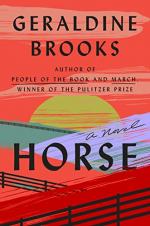|
This section contains 1,692 words (approx. 5 pages at 400 words per page) |

|
Here’s the ground of it, as I see it: a racehorse is a mirror, and a man sees his own reflection there. He wants to think he’s from the best breeding. He wants to think himself brave. Can he win against all comers? And if not, does he have self-mastery to take a loss, stay cool in defeat, and try again undaunted? These are the qualities of a great racehorse and a great gentleman.
-- Thomas J. Scott
(chapter 6)
Importance: During Jarret Lewis’ first encounter with Thomas J. Scott, he is surprised by the white man’s honesty and openness. Here, Scott identifies a self-involved, capitalist motivation on the part of many horse owners. Scott argues that many men view horses simply as extension of themselves; they hope to reflect their own wealth, bravery, and resilience through their horses. This incentive stands in distinct contrast to the powerful, intimate bond that exists between Jarret...
|
This section contains 1,692 words (approx. 5 pages at 400 words per page) |

|



